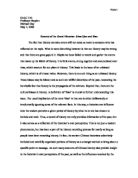Vora
EALC 110
Professor Hayden
Michael Day
May 1, 2008
Records of the Grand Historian: Sima Qian and Bias
The fact that history contains errors will not come as news to someone who has reflected on the topic. What is more disturbing however is that our history may be wrong and that there are great gaps in it. Maybe we have failed to record and gather the events that make up the fabric of history. It is little events, strung together and accumulated over time, which account for our place in history. This leads to the issue of an unbiased history, which is of utmost value. However, there is no such thing as an unbiased history. These biases may be blatant and as such are willful distortions of the past, resonating the inevitable fact that history is the propaganda of the winners. Beyond that, there are the cultural biases in history. A definition of “bias” is crucial to further understanding this issue. The usual implication of the term "bias" is that one is either deliberately or involuntarily ignoring some of the relevant facts. In this way, a historian can influence how the readers perceive a given period of history by what he or she has chosen to include and omit. Thus, a record of history not only provides information of the past, but it also serves as a reflection of the historian’s own perceptions. This is not just a modern phenomenon, but has been a part of the history recording process for nearly as long as people have been recording history. In fact, the ancient Chinese historians selectively included and carefully organized portions of history as a strategic method to bring about a specific point or message. As such many accounts of Chinese history also provide insight to the historian’s own perceptions of the past, as well as the influences received by the historian from their own time and culture. Some of the greatest examples of this phenomenon can be found in the works of one of the most prominent Chinese historians, Sima Qian. Sima Qian’s compilation of Chinese history – the “Records of the Grand Historian,” or “Shiji,” – represent more than just ideologies of his own time. Qian’s records offer insights through his role as a historian and his attempt to resolve a life changing experience he discerned in his own life through a method that would seem objective, but one that is, nonetheless, bolstered with biases. In order to understand how Qian’s life experiences motivated his assemblage of the “Records,” it is necessary to analyze the history and events happening around Qian.
Sima Qian was born in 145 B.C. during the Han dynasty of China (De Bary 369). The Qin dynasty had ruled China immediately before the Han, relying on a legalist doctrine that stressed military power and established the emperor as an all-powerful position that did not require legitimization through support of the people. However, the Han established an empire that would last longer than that of the Qin. The Qin was used as an example of how not to rule, and the ultimate result was the formation of a different philosophy, which was in many ways a complete opposite to the Qin’s ideologies. Essentially, the Han instigated the belief of a “Universal Order” in which Heaven, Earth, and humankind were to be ordered in order to complete all processes (De Bary 283-5). The Confucian ideologies then became especially important to the Han, as they provided for better understanding of metaphysics and cosmic processes. Confucian principles also became important to the Han due to their stress on the importance of music and rites, and their focus to provide ways in which to harmonize people and ensure the Mandate of Heaven, the idea that Heaven would displace the government authorities if they did not carry out the will of Heaven (De Bary 43). Qian’s personal bias against the Qin dynasty, and legalism, is blatant obvious throughout the “Records.” Qian favors Confucianism because it seems to him to be a more preventative way to keep peace amongst the peasantry: if the rulers are fair, just, and moral, the peasantry will be fair, just, and moral. Thus, peace will be obtained. This is opposite legalist views where peace is created and preserved through a tyrannical government that disarms, enslaves, and mistreats the peasantry, nobles, and ministers. Qian consistently depicted the Legalist state of the Qin, the dynasty before the Han, as a sort of evil empire that deserved to fall. When appropriate, Qian made it a point to show that Legalist ideals that were commonplace in the Qin dynasty did not work out for the benefit of anyone, unlike Confucian ideals that did (Sima Qian 172, 273). It is evident that the history of ancient China was convoluted and eventful; as a result, the need for historians became increasingly important.







